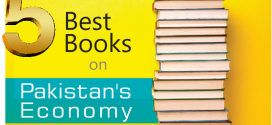By: S. Akbar Zaidi
Pakistan’s economic development and social change over its first 66 years remained spectacular, yet commonplace, and in many ways tragic, observes the renowned political economist S. Akbar Zaidi in his book “Issues in Pakistan’s Economy”. In this book, Zaidi, who is well known as one of the most creative intellectuals and economists of Pakistan, has undertaken the task of not only describing Pakistan’s development efforts in its totality but also rationalising why our national policies failed to hold the country together. The third edition of the book deals with an extensive account of economic performance of the country, as well as the issues of state formation, class and society.
One can hardly disagree with Zaidi’s concluding remarks at the end of the first chapter entitled (“Understanding Pakistan’s Structural Transformation: 1947-2014”) of the book: Compared to what it was in 1947, the country seems like a modern, dynamic state – unlike, say, Afghanistan – but compared to other countries such as Malaysia, Thailand and South Korea, Pakistan’s achievements look minuscule. Zaidi’s analysis of past policies and his appraisal of sectoral and national policies, of the nature and quality of economic development is forthright and categorical. There is no attempt to soft-pedal opinions that are likely to be challenged. He criticises Ayub Khan’s functional inequality in terms of the Marxian criticism of the capitalist system. He is also sharply critical of the structural adjustment programme of the IMF. His explanation of Bhutto’s economic difficulties as ‘bad luck’ and sympathetic treatment of his policies may not be acceptable to many people.
The book, which was first published in 1999, is full of information nuggets, well-researched data and statistics gleaned from authentic sources. It would surely serve as a reliable reference document for scholars of Pakistan’s economic history and the country’s development as well as for those who seek to understand how social and economic processes have an impact on numerous outcomes and forms of structural transformation, and how state and society evolve in a political economy perspective.
 Since the state and the nation would be discussing the state of the economy and debating income and expenditure proposals for the incoming financial year over the next four weeks or so, one thought it only appropriate to alert the official economic managers about the exhaustive work done by Zaidi on the very issues that they would be confronted with during what is considered to be budget season of the year. The book, as its back cover says, is about understanding Pakistan’s structural transformation over six decades in a political economy framework. The author examines how and where such transformations have taken place in the economy, society, in class and gender relations, in the manifestation of consumerism and culture, and other ways. The book has 27 chapters and all of them are highly instructive. A special feature of this book is the author’s mobilisation of statistical evidence in the form of maps, figures and tables, as well as strong arguments to support his conclusions. In addition, he has used box items to define and explain a number of concepts that other authors did not deem necessary. This reader-friendly approach is invaluable for the non-economists and students who should now understand such concepts as feudalism, tax elasticity and buoyancy, fiscal and budget deficits etc., more clearly. A number of controversial subjects have been dealt with in a way as to present arguments on both the sides.
Since the state and the nation would be discussing the state of the economy and debating income and expenditure proposals for the incoming financial year over the next four weeks or so, one thought it only appropriate to alert the official economic managers about the exhaustive work done by Zaidi on the very issues that they would be confronted with during what is considered to be budget season of the year. The book, as its back cover says, is about understanding Pakistan’s structural transformation over six decades in a political economy framework. The author examines how and where such transformations have taken place in the economy, society, in class and gender relations, in the manifestation of consumerism and culture, and other ways. The book has 27 chapters and all of them are highly instructive. A special feature of this book is the author’s mobilisation of statistical evidence in the form of maps, figures and tables, as well as strong arguments to support his conclusions. In addition, he has used box items to define and explain a number of concepts that other authors did not deem necessary. This reader-friendly approach is invaluable for the non-economists and students who should now understand such concepts as feudalism, tax elasticity and buoyancy, fiscal and budget deficits etc., more clearly. A number of controversial subjects have been dealt with in a way as to present arguments on both the sides.
Read More: Growth momentum and imbalances in Pakistan’s economy
But for want of space one would like to focus the discussion on a couple of topics highly relevant in the current context. The chapter on “Structural Adjustment Programme: Composition and Effects” talks of the IMF, the World Bank and the so-called Washington Consensus. In the opinion of the author, since the Structural Adjustment Programmes (SAP) have been in operation for almost a quarter of a century, there is enough evidence to examine their consequences and implications. And the general consensus seems to be that such programmes have very serious negative impacts on growth, inflation, income distribution, social sectors and poverty.
 In general, SAPs have made matters far worse for countries that have followed them. The philosophy that governs such programmes, which is essentially one of liberalisation, openness and greater integration with the new economic world order, does not take into account specific factors and the context of specific countries. With different sets of political and institutional arrangements governing economic and policy choices, the general policy rules of such programmes fail to take root in many countries. The prevalence of highly liquid, hot money, which disappears from a country literally overnight, has serious consequences for an economy that are beyond its control.
In general, SAPs have made matters far worse for countries that have followed them. The philosophy that governs such programmes, which is essentially one of liberalisation, openness and greater integration with the new economic world order, does not take into account specific factors and the context of specific countries. With different sets of political and institutional arrangements governing economic and policy choices, the general policy rules of such programmes fail to take root in many countries. The prevalence of highly liquid, hot money, which disappears from a country literally overnight, has serious consequences for an economy that are beyond its control.
 The most interesting chapter of the book is the last one (“A New Political Economy”). One is tempted to reproduce here the entire chapter which runs into 14 A4-size pages. But space does not permit the luxury. While discussing what he calls counter-hegemony, the author refers to the absence of an organised left political movement since the mid-1970s, and the recent rise of globalised and globalising middle classes and groups which, according to him, means that the margins look more like mainstream: the opposition to the state is led more by sections of what we call the middle classes – such as those demanding water and electricity, not connections, but uninterrupted supply – rather than the working classes, labour and peasants, demanding better working conditions or higher pay. Organised and unorganised jihadist groups have challenged, and continue to challenge, the state of Pakistan and its institutions, such as the military and parliament and politicians perceived to be not Islamic enough. It is also the spontaneous street support of such groups – not all of them are jihadists and many reflect the so-called softer versions of religion – which also underscores the ability to perpetuate violence and the state’s reluctance or inability to directly confront such forces.
The most interesting chapter of the book is the last one (“A New Political Economy”). One is tempted to reproduce here the entire chapter which runs into 14 A4-size pages. But space does not permit the luxury. While discussing what he calls counter-hegemony, the author refers to the absence of an organised left political movement since the mid-1970s, and the recent rise of globalised and globalising middle classes and groups which, according to him, means that the margins look more like mainstream: the opposition to the state is led more by sections of what we call the middle classes – such as those demanding water and electricity, not connections, but uninterrupted supply – rather than the working classes, labour and peasants, demanding better working conditions or higher pay. Organised and unorganised jihadist groups have challenged, and continue to challenge, the state of Pakistan and its institutions, such as the military and parliament and politicians perceived to be not Islamic enough. It is also the spontaneous street support of such groups – not all of them are jihadists and many reflect the so-called softer versions of religion – which also underscores the ability to perpetuate violence and the state’s reluctance or inability to directly confront such forces.
 This book provides the relevant material in quotations from numerous published articles and books to encourage the readers in developing the habit of searching the literature for further detailed perception of the topic concerned from the original source. The emphasis of the book is on providing the information on the processes, based on past experience learnt from half a century, and find out the best options to make the future bright. The book is really an asset to the students, a facilitator for researchers, a guide for academics, and a source of information for general readers.
This book provides the relevant material in quotations from numerous published articles and books to encourage the readers in developing the habit of searching the literature for further detailed perception of the topic concerned from the original source. The emphasis of the book is on providing the information on the processes, based on past experience learnt from half a century, and find out the best options to make the future bright. The book is really an asset to the students, a facilitator for researchers, a guide for academics, and a source of information for general readers.
 Jahangir's World Times First Comprehensive Magazine for students/teachers of competitive exams and general readers as well.
Jahangir's World Times First Comprehensive Magazine for students/teachers of competitive exams and general readers as well.



